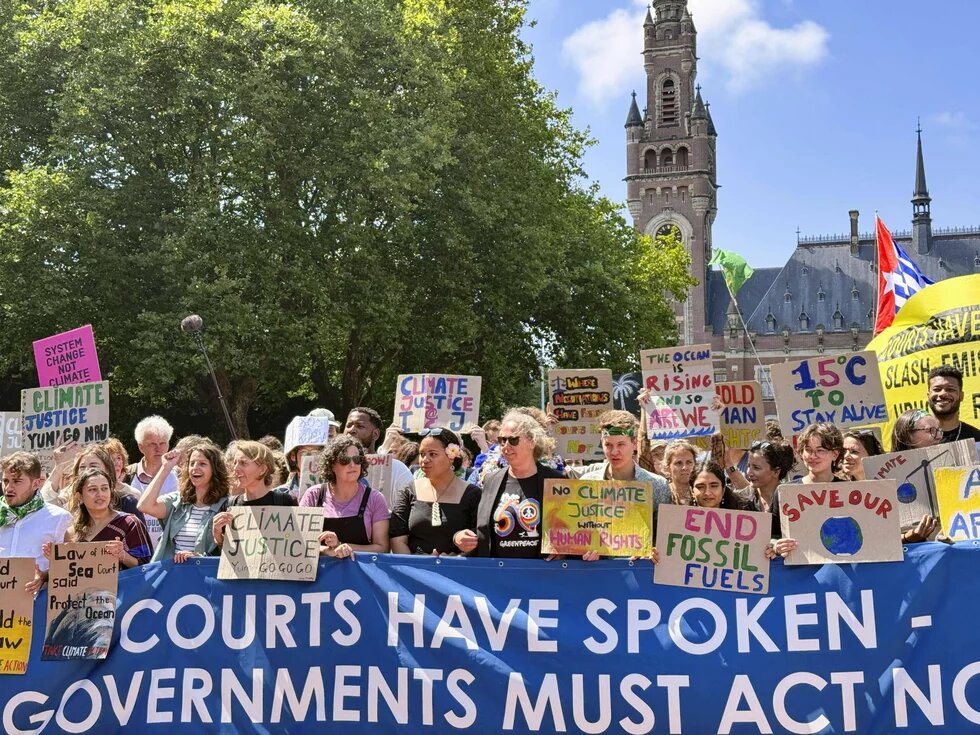Human rights expert Lotte Leicht explains how the International Court of Justice’s advisory opinion reshapes the climate debate: states are legally bound to prevent climate harm. At COP30, states can no longer treat climate action as optional.

What did the Advisory Opinion of the International Court of Justice rule in its most important points? Why is it groundbreaking?
On July 23, 2025, the International Court of Justice delivered a moment of rare legal clarity and moral force. Wrapped up in dry legal language the opinion is an incredibly powerful read, it is clear and so utterly without compromise. The Court gave us a roadmap for climate justice, and in doing so, it signaled the end of legal impunity for big greenhouse gas polluters.
The Court determined that the 1.5°C limit under the Paris Agreement is legally binding -not aspirational- and that all states, particularly the largest emitters, must take ambitious mitigation measures based on the best available science. It rejected the fiction that climate action is a closed-off sphere of non-binding pledges. Instead, it affirmed that obligations to mitigate and adapt to climate change flow not only from climate agreements and treaties, but also from customary international law, human rights law, the law of the sea, and a host of other international treaties and general principles of international law.
States have a legal duty to prevent transboundary climate harm.
And, it went further: the ICJ determined that states have a legal duty to prevent transboundary climate harm. They must act with precaution and due diligence. Inaction is not neutral -it can trigger legal responsibility. And, states can be held accountable not only for what they do directly, but also for what they fail to regulate -such as corporate emissions. The ICJ explicitly put states on notice that they can be liable for failure to address fossil fuel consumption, the granting of fossil fuel exploration licence or the provision of fossil fuel subsidies.
The Court addressed and dismissed a long-standing defense used by states with high greenhouse gas emissions (GHG): that climate change is too complex, too collective, too global for any one country to be held responsible. The ICJ disagreed. Climate complexity does not erase legal clarity and individual state accountability. A state’s share of harm can be attributed using science, and no state can hide behind the emissions of others. In plain terms ‘hiding in the GHG polluter pack’ will not shield from individual state responsibility and accountability.
So to sum up some of the key findings that make this ruling historic:
- The 1.5°C limit is legally binding and must guide all state conduct, including nationally determined contributions (NDCs), licensing, subsidies, and regulation.
- States have binding obligations under customary international law to prevent foreseeable climate harm. GHG emissions are mass pollution that knows no borders and states are accountable for transboundary harms.
- Fossil fuel subsidies, exploration licences, continued production, and subsidies can breach international law.
- Climate obligations are owed erga omnes -so to the international community as a whole.
- Attribution of harm to individual states is legally viable, also in the face of collective emissions.
- States have a duty to regulate private actors whose emissions cause harm -including fossil fuel corporations.
- Breach of obligations triggers accountability including: cessation, guarantees of non-repetition, and reparations.
- The principle of non-refoulement applies to people displaced across borders by climate impacts. States may not return climate displaced people to countries where their lives would be at serious risk.
- Island nations do not lose statehood or maritime rights if their territory is submerged.
Big GHG polluters can be held accountable.
Yes, this advisory opinion is a watershed moment. It affirms what frontline communities have known for years: climate injustice is not just a political failure. It is a legal wrong. And, with the law on their side they are fighting back, and big GHG polluters can be held accountable.
What was the case that was brought to the Court, and who brought it at this particular moment in time?
It began not in a government ministry or international summit, but in a classroom with Pacific Islands students who dared to think big and who decided to launch a campaign to take on the biggest global human rights crisis of our time, the climate crisis, and to do so with the law. Their slogan said it all: “We are taking the world’s biggest problem to the world’s biggest court.”
For them the climate crisis was not abstract. They were living it -rising seas, intensifying storms, damaged homes, threats to lives and livelihoods. And they saw with fierce clarity that international law had been failing to protect them. So they launched a campaign that sparked a global youth movement, won the backing of Vanuatu and other climate-vulnerable states, and ultimately secured a historic unanimous resolution from the UN General Assembly in 2023 requesting the ICJ to clarify two core questions:
- What are the obligations of states under international law to ensure the protection of the climate system and environment for present and future generations? and
- What are the legal consequences under international law for states that have caused significant climate harm and breached these obligations?
These are questions that strike at the very core of climate justice, and indeed climate injustice: Who is responsible? For what conduct? And what is owed to those who suffer the consequences but did the least to cause this climate crisis?
The students, the small island states and other climate vulnerable states brought the lived reality of the climate emergency into the halls of the UN and ultimately before the judges in The Hague. They confronted the silence of law with the urgency of justice. And on July 23, 2025, the ICJ responded with a ruling that reflected not only the gravity of the climate crisis, but the leadership and vision of those who made this landmark advisory opinion happen.
What does this ruling mean for the connection between human rights and state obligations regarding climate change?
The ICJ could not have been clearer: the climate crisis is also a human rights crisis.
The Court affirmed that climate change undermines the enjoyment of rights protected under international law -including rights to life, health, food, water, housing, family, and self-determination. It recognized the right to a clean, healthy, and sustainable environment as foundational and enforceable, rooted in human rights treaties and customary international law.
And, the ICJ recognized that these rights extend not only to those alive today, but to future generations. Climate obligations are intergenerational. States must act not just to protect people now, but to safeguard the rights of those who are yet to be born.
In other words, climate inaction is not just negligence, it is a serious violation of human rights.
What did the Advisory Opinion rule on climate mitigation obligations?
The Court confirmed that states have a legal obligation to reduce emissions in line with the 1.5°C target, using the best available science. This obligation is not confined to climate treaties. It is reinforced by customary international law, which binds all states -so also the United States that has withdrawn from the Paris Agreement.
Climate treaties do not displace broader international law, they are part of it.
The ICJ confronted head-on the argument that the climate treaties are a self-contained legal regime (a so-called lex specialis) that excludes other rules. It rejected this. Climate treaties do not displace broader international law, they are part of it. Obligations to prevent harm, act with precaution, and ensure due diligence remain fully applicable to climate change and GHG pollution.
And, as I already said the Court was even more specific when it stated that states can be held legally responsible for failing to regulate GHG pollution from the main driver of the climate crisis, fossil fuels.
The message is clear: the era of voluntary emissions targets and unchecked fossil fuel expansion is over. The German government should take notice!
What does this ruling mean for future litigation, especially in terms of liability and climate reparations?
The ICJ opened a powerful new chapter for climate accountability. Where there is a right, there is a remedy!
The Court confirmed that legal responsibility arises when states breach their obligations -by action or omission- and that attribution of transboundary harms to individual states is legally viable. Scientific attribution evidence, including cumulative emissions data, can establish a sufficiently direct causal link.
Where responsibility is found, the legal consequences include:
- Cessation of the wrongful conduct - this could mean revoking licenses or subsidies.
- Guarantees of non-repetition - requiring future safeguards.
- Full reparation, which includes restitution (e.g. ecosystem restoration), compensation for financial harm, and satisfaction (e.g. formal apologies).
This landmark advisory opinion has provided a legal basis for loss and damage claims, both between states and in international and domestic courts. It empowers litigation against governments that continue to enable and back fossil fuel expansion, ignore scientific warnings, or fail to protect communities from foreseeable climate harms and the resulting human rights violations.
The Advisory Opinion states that a state doesn’t lose statehood and self-determination if it loses territory. What does that mean?
Yes, the Court determined that if a small island state loses part or all of its territory due to sea-level rise, it does not lose its statehood, sovereignty, or maritime rights. This offers a crucial legal safeguard to countries like Tuvalu or the Marshall Islands, whose existence is threatened by a climate breakdown they did not cause.
This is more than symbolic. It means that even in the face of existential climate threats, the international legal system will recognize and uphold the rights, identity, and agency of affected nations. It is a lifeline of legal continuity in an era of climate disruption and one that small ssland states have long fought for.
What does the Advisory Opinion mean for COP30 in Belém? How will it change the debate?
The ICJ’s opinion fundamentally reshapes the terrain ahead of COP30. It injects binding legal clarity into what has often been a murky arena of voluntary commitments and political compromise dictated by the biggest GHG polluters. At Belém, the focus should no longer be on what states are willing to do, but what they are legally required to do. The advisory opinion reinforces the legal imperatives behind demands for climate finance, fossil fuel phase-out, and a just transition -grounded in the principles of equity and historical responsibility.
The ICJ’s opinion fundamentally reshapes the terrain ahead of COP30.
For frontline states, affected communities, and civil society, this ICJ opinion arms them with an authoritative legal tool to confront inaction, delay, arrogance and greenwashing. It elevates the moral and legal stakes of the negotiations and should make it much harder for GHG polluters to pretend that their conduct is a matter of sovereign discretion. It is now a matter of legal compliance.
It raises the floor for climate ambition. It reframes mitigation and adaptation not as charity or policy choices, but as legal obligations.
At COP30, negotiators can no longer pretend that climate action is optional. The Court has made it clear: states have a legal duty to act. And if they don’t, they may be held responsible. I’m sure many big GHG polluting states will argue that an ICJ advisory opinion is “none-binding”. That is of course true, but the international law that the ICJ has now interpreted in the context of the climate crisis certainly is binding - and the obligations under customary international law apply to ALL states even if they are not parties to specific treaties.
For those who have long fought to be heard -youth, Indigenous peoples, climate-vulnerable states and communities -this ICJ opinion is both vindication and leverage.
In a time of eroding trust in international law, especially in the Global South, can this ruling change perceptions?
Yes, and I would dare to say that in some ways it already has.
The ICJ’s opinion reflects what many of the Global Majority have long demanded: legal recognition of their suffering, their leadership, and their rights. It places responsibility where it belongs -on the big GHG polluters who have, and continue to devastate the climate system, not those who are forced to live with its consequences.
It shows that international law can be used to protect people and the planet, rather than corporate interests, ruthless greed, and polluting states’ power. It restores the idea that the law can rise to meet the moment of urgency when politics fails.
The ICJ’s ruling offers a corrective to decades of arrogance, ignorance, and impunity, where legal systems have failed to hold major GHG polluters accountable for their devastating harms to the climate system and to the rights, lives and livelihoods of millions. It shows that international law, when activated and clarified, can serve and help advance justice. If followed up by litigation, legislation, and enforcement, this ruling can make a real difference for millions of people and for the safety of our planet, and help restore faith in the idea that the law can serve the many, rather than protect the powerful from accountability.
What will it depend on for this ruling to be implemented and make a difference?
The ICJ has given us legal clarity. But implementation will depend on political will, public pressure, climate action and yes, litigation. It will require follow-up at the UN General Assembly, national legislatures, regional and international negotiation forums. With the law on our side we can push for ambitious climate policies, actions, and finance.
We must insist that states heed the ICJ’s clear message: climate harm is no longer politically justifiable or legally defensible. The fossil fuel industry, long protected by regulatory capture and legal ambiguity, has now been placed on notice. The ICJ named it directly. Subsidizing, licensing, and expanding fossil fuel production are no longer just bad policies - they may constitute internationally wrongful acts.
This is a moment of urgency and importance. It affirms that when politics fails, the law can rise to the challenge. It’s a moment when youth and climate-affected nations aren’t just at the table - they are showing the way and reshaping the system itself!
This ICJ opinion is a roadmap for climate justice, for accountability, for scientific facts, for the rights of present and future generations. Now it’s up to us to walk that path.
The interview was conducted by Layla Al-Zubaidi, Acting Director of International Department & Head of International Policy Devisions at the Heinrich Böll Foundation.


